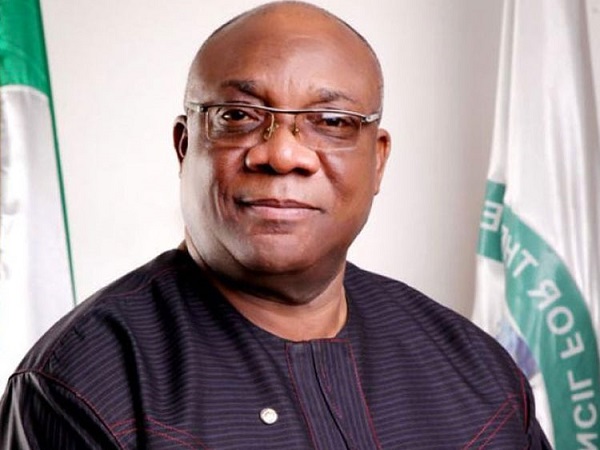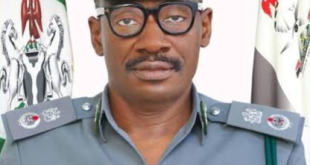
By Kenneth Jukpor and Ayoola Olaitan
Barr. Samuel Nwakohu is the Registrar, Council for the Regulation of Freight Forwarding in Nigeria (CRFFN). He is also the Committee Chairman, Maritime Task Team on COVID-19. A team set-up by Nigerian Shippers’ Council (NSC), comprising Nigerian Ports Authority (NPA), Nigerian Maritime Administration and Safety Agency (NIMASA), Nigerian Navy, Nigeria Customs Service (NCS), Police and other port stakeholders. In this interview with MMS Plus newspaper, he speaks on port activities under the pandemic, highlighting the role of the task team.
How would the two weeks extension of the lockdown affect the activities at the ports in terms of making it more operational?
The two weeks extension is in response to what is happening in the country today. Each morning we wake up to realize that the number of coronavirus infected persons have increased. So, the extension was expected. In fact, I would have been surprised if the President, Mohammadu Buhari did otherwise. We acknowledge that there would be hardship to be encountered as a result of the extension. The hardship has actually been there since the commencement of the lockdown but it is a sacrifice we must all make in order to contain this pandemic which has no cure at as today.
For port operations, the reality is that we are in abnormal times. We don’t expect optimum performance in any sector of the ports at all. This is because the chain has been affected and it would trickle down to other aspects of the logistics chain. We have talked about the banks which haven’t been open; we talked about transportation and other key elements that should make the ports function optimally that have been shutdown. Those that aren’t completely shutdown are only providing skeletal services. So, these challenges are bound to affect the operation of the ports. The question I ask myself is – should this lockdown continue and I found that the answer is yes because we must remain alive to be able to make progress in this sector. If the goal is to make money, we must first stay alive to be able to make it.
There is argument that despite the lockdown the number of cases keep increasing. With the continuous rise in Covid-19 cases, does that justify the lockdown? What if the situation worsens after this additional two weeks?
Yes, we have been asked to stay home for the initial two weeks and we complied and also agreed to another two weeks. If the numbers doesn’t come down afterwards then we must ask the health officials , scientists and those managing the situation for an explanation. However, from what we have witnessed in other countries, the situation can be managed by staying home to prevent the spread of the virus.
Let’s take Kano State for example, two weeks ago they had zero coronavirus cases but suddenly there were thirty-six incidents. The explanation was that there was one gateman who came from Lagos and he had it. The question is how many people has he infected? Would these people have contacted it if he didn’t go to Kano? The answer is no!
Today, we must begin to ask how many people have been tested and what is the level of testing? The symptoms may not have shown up in many people to the extent that they are shutdown completely, yet it could be there.
Although the federal government has directed that we stay at home, the only way to truly address this menace would be to increase the number of testing centres in the country.
There have been cases of banks not opening to support port operations as well as police harassment of freight agents even though there has been Presidential directive that they are excluded from the lockdown. How do you rate these developments?
What this committee can do is to proffer advice where necessary. The reality is that banks aren’t opening but we must understand that they also care about the welfare of the members of their staff. They are also trying to comply but most of them are offering skeletal services and we cant take that away from them.
The only thing we can do is to appeal to them to enable the ports operate fully by extending their services. Some of the banks are operating from 9am to 3pm and I wouldn’t advocate for extension of the hours. What I would ask for is that they open from Mondays to Fridays and ensure that they render the services for that period. The recipients of the services should also understand that it isn’t business as usual. They should be able to enlarge their patience. Small branches may not be able to allow more than five or six people inside in the bid to adhere to social distancing. This means people may have to queue up outside and wait. They must be patient because this isn’t the norm.
For the Police, I think they are doing well but they could do better to ensure freight forwarders and other port workers go about their activities without intimidation. There have been unpleasant cases with port operators and police in recent times but I don’t want to attribute it to the entirety of the Police because it could be just few bad eggs in the system. There are still police officers who are going about their duties diligently.
I will be visiting the District Police Officer (DPO) in charge of Area B Police Station to lodge a formal complaint and write to the Inspector General of Police in respect of the disturbance. We also want the IG to send signals for the officers in Lagos to allow legitimate freight forwarders go to the port to perform their duties, especially on essential goods.
Do we have the records of the volume of business that have been done at the ports under the lockdown to manage the spread of Covid-19?
It is possible to generate this figure but the statistics aren’t available to me at the moment. Nigerian Ports Authority (NPA) and Nigerian Shippers’ Council (NSC) should have these details. I am sure if you ask at these agencies you would be able to get the actual figures, however, I don’t have it at the moment.
Does the committee also take care of the overtime cargo movement at Ikorodu?
Well, I won’t say yes and I won’t say no; but we are addressing the issues holistically. If cargoes have to move to Ikorodu and they aren’t moving, the committee could ask Customs what this problem is and why the cargoes have not moved. This is because we want a situation where the port is decongested at every point in time.
On the part of the terminal operators,have they started responding to the directives to suspend their storage charges?
Well, today we have an engagement with the terminal operators and they said discussions are ongoing with NPA. The answer terminal operators gave us was that they were still holding talks with NPA on this issue.
NPA has given the terminals areas of compensation. So, what other discussions are they having?
Well, I don’t know. These are some of the things we are discussing. NPA came out with a clear directive to say that from this period to this period we will compensate you with credit notes. I don’t know why the terminal operators are still discussing it but they came today and said the discussion is ongoing.
Are you sure this challenge isn’t also affecting the flow of cargoes at the ports, especially cargo evacuation?
I don’t think so. We haven’t gotten to the point where this would affect the activities at the ports. This is just starting; however, I believe that in the next couple of days all the grey areas will be resolved.
There have been complaints by freight forwaders that they are being subjected to NPA clearance via port pass and CRFFN also does the same. What’s your take on this?
I have been accused a few times that I allow NPA take control of activities that should be handled by CRFFN.
Why would NPA be giving freight forwarders cards to access the ports? It impacts negatively on the leadership of CRFFN. I don’t think that is right.
This is the basic role of CRFFN because we are giving freight forwarders identity (ID) cards as operators. Why should NPA also give freight forwarders ID cards to access the ports, while we are here? When are we going to have the opportunity to show visibility? This isn’t right.
Another thing we are looking at, is a situation where every stakeholder’s imprint or logo will be on the port access card. It will encourage the freight forwarders to attend meetings and it would also encourage them to fund it, among other benefits.
Generally speaking, if any agency should issue pass to freight Forwarders, it should be CRFFN.
Would there be identity cards for freight forwaders operating under this lockdown?
Shippers’ Council and CRFFN thought about producing ID cards for freight forwarders for this period.
We have decided to make about 300 copies of ID cards and we would give 100 to the Association of Nigerian Licensed Customs Agents (ANLCA), 100 to National Association of Government Approved Freight Forwarders (NAGAFF), 50 copies would be shared among other freight forwarding associations and the final 50 copies would be shared to other port officials.
Shippers’ Council provided five buses for the freight forwaders and CRFFN provided one bus and the security personnel. No one is talking about what CRFFN has done, yet, everyday it costs me N80,000 to N100,000 thousand for the security on the buses. We have ten buses and the cost of placing one police officer on each of the buses is N10,000. This amounts to N100,000 for the ten buses daily. We considered placing two police officers per bus earlier and that would have cost us N200,000 daily.
 MMS PLUS NG – Maritime, Aviation, Business, Oil and Gas News Online Newspaper with coverage in Maritime, Oil and Gas, Aviation, Power and Energy as well as Financial News
MMS PLUS NG – Maritime, Aviation, Business, Oil and Gas News Online Newspaper with coverage in Maritime, Oil and Gas, Aviation, Power and Energy as well as Financial News









